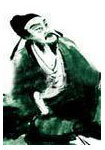《四祖寺》 趙嘏
自為心猿不調伏,祖師元是世間人。
作者簡介(趙嘏)

趙嘏 , 字承佑, 楚州山陽(今江蘇省淮安市楚州區)人, 約生于憲宗元和元年(806). 年輕時四處游歷, 大和七年預省試進士下第, 留寓長安多年, 出入豪門以干功名, 其間似曾遠去嶺表當了幾年幕府。 后回江東, 家于潤州(今鎮江). 會昌四年進士及第, 一年后東歸。 會昌末或大中初復往長安, 入仕為渭南尉。 約宣宗大中六、七年(852、853)卒于任上。 存詩二百多首, 其中七律、七絕最多且較出色。
《四祖寺》趙嘏 翻譯、賞析和詩意
四祖寺詩詞賞析:
《四祖寺》是唐代詩人趙嘏創作的一首詩詞。這首詩通過描繪四祖寺的景色,抒發了作者對自身困境的思考和對佛教教義的理解。
詩中描述了四祖寺松樹叢生,雙峰聳立的景色。這里的"松下雙峰寺"一句,既是景物描寫,又融入了佛教的思想,暗示著佛教教義的高潔和莊嚴。
接下來,詩人提到自己身處其中的景色,卻只有一盞燈的光亮。這句"一盞燈前萬里身"把詩人的身份置于寂靜與孤獨的環境中,并融入了禪宗思想中的修行與證悟的意味。燈光的微弱與無盡的身影,給人以一種寂寞、迷茫和思考的感覺。
接著,詩人表明了自己內心的無法駕馭和追隨的狀態,稱其心靈為"心猿"。"自為心猿不調伏"這句,表達了詩人對自己內心波動、難以駕馭的困惑和痛苦。同時,也折射出作者對自己修行狀態不佳的反思。
最后,詩人提到四祖是實在的存在,指明了佛教的祖師在世間是真實存在的人。這句"祖師元是世間人"既是對佛教教義的肯定,也是對佛教修行者的鼓勵和警示。
整首詩以景物的描寫和個人的內心狀況相結合,通過抒發自己內心的疑問與不安,表達了對佛教教義的追求與思考,體現了唐代佛教文化的主題和特點。
中文譯文:
四祖寺
千株松下雙峰寺,
一盞燈前萬里身。
自為心猿不調伏,
祖師元是世間人。
Poem Translation:
Temple of the Fourth Patriarch
Beneath a thousand pine trees rests the temple,
Before a single lamp, my body stretches for a thousand miles.
Unable to conquer my monkey mind,
The patriarch, fundamentally, is but an ordinary person.
Appreciation:
"Temple of the Fourth Patriarch" is a poem written by Tang Dynasty poet Zhao Gu. This poem depicts the scenery of the temple and expresses the poet's contemplation on his own dilemma and understanding of Buddhism.
The poem describes the temple with its dense pine trees and towering twin peaks. The phrase "Beneath a thousand pine trees rests the temple" not only describes the scenery but also implies the purity and solemnity of Buddhist teachings.
Next, the poet mentions his own presence in this scenery, lit only by a single lamp. The line "Before a single lamp, my body stretches for a thousand miles" places the poet's identity in a silent and lonely environment, incorporating the meaning of practice and enlightenment in Zen Buddhism. The dim light and endless shadows create a sense of loneliness, confusion, and contemplation.
Furthermore, the poet reveals his inability to control and follow his own mind, describing it as a "monkey mind." The line "Unable to conquer my monkey mind" expresses the poet's confusion and pain over the fluctuations and uncontrollable nature of his inner self. At the same time, it reflects the author's reflection on his unsatisfactory state of practice.
Finally, the poet mentions that the Fourth Patriarch is a genuine person in the world, affirming the truth of Buddhist teachings. The line "The patriarch, fundamentally, is but an ordinary person" serves as both an affirmation of Buddhist teachings and encouragement and warning for Buddhist practitioners.
The poem combines the description of the scenery with the poet's inner state, expressing his pursuit and contemplation of Buddhist teachings. It reflects the themes and characteristics of Buddhist culture during the Tang Dynasty.
《四祖寺》趙嘏 拼音讀音參考
sì zǔ sì
四祖寺
qiān zhū sōng xià shuāng fēng sì, yī zhǎn dēng qián wàn lǐ shēn.
千株松下雙峰寺,一盞燈前萬里身。
zì wèi xīn yuán bù tiáo fú, zǔ shī yuán shì shì jiān rén.
自為心猿不調伏,祖師元是世間人。